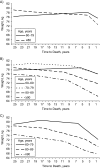Changes in weight at the end of life: characterizing weight loss by time to death in a cohort study of older men
- PMID: 20682520
- PMCID: PMC3025636
- DOI: 10.1093/aje/kwq168
Changes in weight at the end of life: characterizing weight loss by time to death in a cohort study of older men
Abstract
The purpose of this analysis was to characterize the natural history of weight change in the years prior to death among older persons and to examine how this pattern varies according to longevity and cause of death. Weight trajectories were analyzed by using data from 800 male decedents from the Baltimore Longitudinal Study of Aging (Maryland, 1958-2005) observed beginning an average of 19 years before death. A model including 3 distinct periods of weight change (weight stability/gain, mild weight loss, and accelerated weight loss before death) provided the best fit for all age-at-death groups. Approximately 9 years before death, the rate of weight loss increased to an average of 0.39 kg/year (P < 0.001) for all-cause mortality. For cancer deaths, weight loss accelerated significantly 3 years before death, regardless of age group. For cardiovascular deaths, the best-fitting inflection point increased with age, from 5 years for participants aged 60-69 years to 9-10 years before death for those aged 80 years or older. Results suggest that weight loss in older persons may begin earlier than previously believed. The duration of weight loss for noncancer deaths suggests that even distal changes in energy balance may be linked to risk of death.
Figures



References
-
- Wannamethee SG, Shaper AG, Whincup PH, et al. Characteristics of older men who lose weight intentionally or unintentionally. Am J Epidemiol. 2000;151(7):667–675. - PubMed
-
- Newman AB, Yanez D, Harris T, et al. Weight change in old age and its association with mortality. J Am Geriatr Soc. 2001;49(10):1309–1318. - PubMed
-
- Freedman DM, Ron E, Ballard-Barbash R, et al. Body mass index and all-cause mortality in a nationwide US cohort. Int J Obes (Lond) 2006;30(5):822–829. - PubMed
-
- Andres R, Muller DC, Sorkin JD. Long-term effects of change in body weight on all-cause mortality. A review. Ann Intern Med. 1993;119(7 pt 2):737–743. - PubMed
-
- Allison DB, Faith MS, Heo M, et al. Meta-analysis of the effect of excluding early deaths on the estimated relationship between body mass index and mortality. Obes Res. 1999;7(4):342–354. - PubMed

